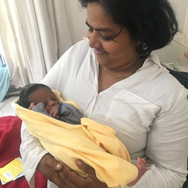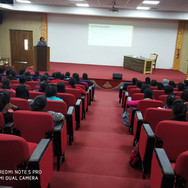This quarter was marked by problem-solving, planning, and progress. We were thrilled to learn that in a recent study on shelters, IFW was listed as one of two model shelters in South Karnataka, India. We also celebrated the finalisation of a cloud-based database that houses information on all our former and present residents, along with counselling notes and other shelter details. Thanks to the charitable efforts of a local software agency, we will be able to keep pertinent shelter details organised and accessible.
SHELTER RESIDENCY
Throughout the quarter, we facilitated ongoing problem-solving among the residents in terms of adjustment to incoming residents. At present, the shelter is housing 22 women and 11 children. One woman with three children left the shelter due to aggravated mental health concerns after staying for six years. Another survivor, D, returned to the shelter with her daughter. She had previously been at the shelter for five years, and came back because she valued the education and counselling services provided, and there was no support network for her otherwise with her husband a chronic alcoholic. Another resident left her abusive husband and came to the shelter with her two children.
Several residents took crucial steps in their cases. As T’s custody battle for her three children began, we helped to facilitate a transfer of her case from one location to another, and she had to visit court as proceedings began. P’s mother forced her to return home to see her son, despite the presence of her severely alcoholic husband. In A’s case, a settlement is being negotiated and the case for her and her two children is coming to a conclusion. M’s perpetrator was arrested and put in jail, and the story came out in the media. She is now exploring the safety of returning to society and home, and if she feels any threat remains, she will stay at the shelter. We also made arrangements for compensation money for one of our residents, who we previously had referred to another organization; now that she’s returned to the shelter, we are working to retrieve her money and create an account for her. L’s husband, a severe alcoholic, came to the shelter after she had revealed the location. He seemed interested in reuniting with L and their two sons and making changes in his behavior, so we encouraged him to enter rehab and agreed to work with him if he completed the program. Under our supervision, he entered a local values-based rehab center for the first time in twenty years as an alcoholic.
We also sheltered a highly educated woman with high standing, E, who had experienced continual sexual harassment in her workplace, pursued a case, and created a mass movement. We discovered she had mental health issues that aggravated her experiences. During her stay, we met with a law firm to discuss her sexual harassment case. E stayed with us for one month before moving on to another shelter, where she only stayed for one day. We learned her parents then took a small apartment for her.
Additionally, we had the opportunity to speak into a few cases not requiring our immediate assistance. In one instance, we gave a referral to someone who called about a domestic violence case for a lawyer in Chennai. We also referred a woman with HIV to another local organization.
In a more unusual case, we welcomed a young woman, T, who came to the shelter seven months pregnant with her pet dog in tow. Before coming under our care, she hadn’t received any antenatal care. The government hospital refused to give her antenatal care because she didn’t have proper ID proof; so we contacted a private hospital, which cost more, but they started proper treatment as she entered her third trimester. As we learned more about T’s story, we decided to do an HIV test due to high-risk behavior. We also went to the police and gave evidence of her former live-in boyfriend and the father of her child with regard to him giving maintenance fees for the baby, along with delivery charges. Her perpetrator was tracked down and agreed to give money, but he didn’t meet the deadline and then absconded. As a result, the authorities put a case of cheating on him. T continued to receive antenatal and psychiatric treatment as psychosis became evident. On 27 August, she started having contractions, and on 28 August, T delivered a baby boy. Amid the joy of the birth, the doctors expressed concern about the baby’s organs because he was born with a nodule on his hand that could indicate internal nodules. The baby was scanned to ensure there weren’t any issues and doctors detected a hole in his heart. Thankfully, they said it would close after several days; however, the nodule on his hand became infected after three weeks and had to be removed at the local hospital.
In the first month after her child was born, T struggled with postpartum depression. Compounded with her previous psychosis, she began quarreling regularly with the other residents and exhibited jealousy over her month-old son’s responses to the women. Though she desperately needed the help of the other women, her jealousy and demands quickly isolated her. She reached a tipping point one evening when she began threatening to take her own life and the life of her child. The other women responded quite intensely to her threats, demanding that she leave the shelter. The staff worked to mitigate the issues and pursued further psychiatric treatment for T. But after a few weeks of intense counselling, T decided she wanted to leave the shelter with her baby as she felt she was being treated unfairly and unkindly by the other women. We helped her to make arrangements to go to another local shelter with her baby, and she made the shift at the end of September. While this certainly wasn’t an ideal scenario, we believe the shift was best for T as she continued to struggle with her psychosis and was regularly stirring up anxieties and troubles for herself and the other residents.
EDUCATION
Several activities and developments took place in areas of education, training, and awareness this quarter. We interviewed and brought in a trained playschool teacher for Blossoms, the shelter homeschool, and she has reported noted improvement among the children with the implementation of further structure in their schedule. Blossoms leaders also met about how to improve the services of the homeschooling and address current needs—something we are looking to do regularly now that we have several new staff teachers in place. Blossoms celebrated Independence Day on 15 August with songs, dances, a flag hoisting, and a moving speech from one of the residents. It was a joyful occasion that residents and staff enjoyed together.
We also navigated issues that came up this quarter for one of our child residents who attends a nearby government school as per her case needs. Due to current requirements, the school was asking for a caste certificate for the girl, which she did not have, so we pursued options on her behalf.
On the training and awareness front, our shelter director was invited to speak at a local college. She and two shelter women, whose faces were covered by shawls, spoke to B.Com. undergrad students on gender sensitivity and received positive feedback from the discussion. We also held child protection training at the shelter, with sessions facilitated by a local freelance social worker for volunteers, residents—both women and children—and staff. The session addressed many potential concerns and was beneficial to all involved.
VOCATIONAL TRAINING & INCOME GENERATION
It is imperative that we pursue sustainable funding options for the shelter, and we made concerted efforts to that end this quarter. We made a connection with a local corporate office and made arrangements for a sample day in their staff cafeteria with sweet and savoury goods from our Bread of Life baking unit. The samples were well received, but due to our lack of licensing, the company was unable to set a contract with the shelter. However, they affirmed their interest in utilizing the shelter if we are able to secure proper licensing in the near future. We initiated the process of securing a trade license so that we’re able to sell our goods and establish contracts with local businesses, and we met with local consultants to get further details on the requirements. To that end, we also completed and submitted a proposal to a funding agency that we hope will alleviate the initial fees for the licensing. We anticipate taking next steps in this process in the upcoming quarter.
As for the Bread of Life baking unit, we continued to supply local cafes with baked goods, and are now also supplying coffee and Indian snacks to a local organization each week. Additionally, we received and filled a large order from a local neighborhood for a holiday celebration to resoundingly positive feedback.
In terms of organisational funding, we celebrated the successful procurement of quarterly support from a local funding agency after finalizing and submitting a proposal, and presenting the organisation to the agency’s board.
A funding organization with which we’re connected also organized a benefit concert to raise support for our resident, R, to help with her healthcare and mental care costs. The response to R’s needs was heartening.
COUNSELLING & MENTAL HEALTH
We addressed the continuing mental health and emotional needs of our residents in several ways this quarter. Several activities intended to further equip the residents with understanding and knowledge about their circumstances included the screening of movies on domestic violence and gender sensitivity, and a session on boundaries with a staff counsellor and a professor from a local university. A resident from the local community also invited the shelter children to their home for a session on relationships and how to say no to toxic relationships; the kids received snacks and gifts during their visit.
One-on-one therapy sessions began for four of the children, along with two new residents. T, who was pregnant, received antenatal and psychiatric treatment as psychosis became evident.
We offered intervention in several cases this quarter. Some residents struggled with instances of hitting their children, and we addressed these issues with anger management training and counselling. We also took two young teens, K and D, to a local mental health facility for assessments. We learned that K is dyslexic, and the facility scheduled an appointment for him to meet with a psychologist, a pediatrician, and a neurologist to certify his dyslexia. The facility determined D needs additional family counselling because there is clear preferential treatment from his mother toward his sibling; these sessions will be facilitated at the shelter by our counsellors. In E’s case, we pursued a psychiatric shelter for her care, but her father, who is very much involved in her case, wasn’t cooperative or supportive.
VOLUNTEER SUPPORT
We rely heavily on volunteer support to keep the shelter running and to offer new experiences to the residents during their time in our care. We were glad to welcome several new volunteers to the shelter this quarter, and many generous clothing and provisional donations from the community. Three students from a local postgraduate institution began regular visits—one male student teaches English and guitar, and two females provide mentoring, teambuilding, and life skills training. Several Hindi-speaking residents also began receiving mentoring from a local couple. A local musician also began weekly music lessons, quickly becoming one of the favorites among the women and children.
Additionally, we were pleased to bring on a new volunteer accountant, whose expertise has boosted our accounting efforts on many fronts. He has helped us to backlog our accounts into a new online system and has provided crucial financial advice on governance and regulations for NGOs, assisting us in getting up-to-date with regulations.
In Blossoms, we have benefited from the weekly volunteer efforts of two women with educational backgrounds who have helped with admin and structure, along with English tuitions.
One of our volunteers also trained staff and volunteers on the new cloud-based database and our counsellors are now inputting session notes on a regular basis.
JOYS & CELEBRATIONS
In the midst of counselling sessions, emotional and mental difficulties, family trouble, court cases, and any other number of difficulties the shelter residents face, we seek to offer moments of respite and joy. The shelter residents enjoyed several activities over the last quarter. Everyone looks forward to a weekly movie night, and we were able to introduce several new family friendly movies to the rotation. We also addressed the quality of afternoon programs the children are watching and screened all shows so that they’re viewing more educational and age-appropriate shows, and the women are watching more regional-language movies with less violent storylines.
The children had the opportunity to take a field trip to a book show, where they were able to select books of their choice and fill a big box to bring back to the shelter. On another occasion, they soaked in a day of fun and food at a local farmhouse, where they played alongside monkeys and dogs. Several of the boys also were invited to play football at a local field once a week, joining residents from a local rehab centre.
This quarter, our organisation also was delighted to be granted a three-year renewal on our shelter lease. We’re overjoyed to anticipate several more years of growth and stability at our current location.
CASE STUDY
Rupa*, a victim of gang rape from the north part of the country, came to the shelter after she was found and rescued from a bus stop. Hers was a high-profile case that highlighted the need for women’s safety and rights. Unfortunately, the NGO that took her in didn’t know what to do with her after they became short-staffed, so they looked for alternative locations and came to know of IFW. They approached us with the case, and we were able to receive Rupa.
Rupa is now participating in regular therapy sessions and is taking psychiatric medication that has helped to stabilize her. Recently, she also began weekly physiotherapy sessions with a volunteer physiotherapist, the son of one of our regular volunteer counsellors. Rupa was attacked with a stone and had gone through surgery, but needs ongoing care.
Since coming to the shelter, Rupa has demonstrated noted emotional and mental improvement. Due to injuries sustained during her attack, she continues to struggle physically, but she has stopped using cigarettes and a mild drug that she had frequently abused. She also has begun pursuing a creative outlet in jewelry making, which another of our therapists has facilitated. Rupa is eager to make some petty cash over the holidays by selling the jewelry she has produced.
We are encouraged to see Rupa continue to step out of her brokenness as she heals emotionally, mentally, and physically.
*Name changed for privacy and security purposes
CONCLUSION
Each day at IFW brings new challenges and even greater joys. It is only because of the dedication of our generous supporters that we are able to continue our efforts and see positive fruit and progress in the lives of the women and children entrusted to our care.
Best to you and yours,
Institute for Family Well-being

































